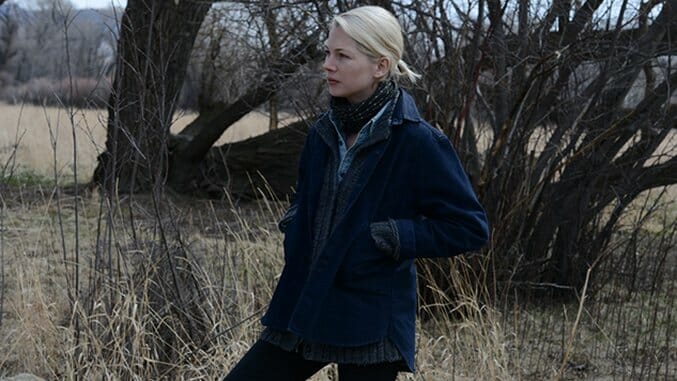
The silence speaks volumes in Kelly Reichardt’s films. In works like Old Joy, Wendy and Lucy and Meek’s Cutoff, she has explored how people spend most of their day thinking, not talking, and that perhaps those quiet moments can be as revealing of character as anything that comes out of their mouths. (And, let’s not forget, even when we speak, we’re rarely saying precisely what we mean.)
Reichardt’s less-is-so-much-more approach is again on display beautifully in Certain Women, a series of three barely interconnected stories in which the empty spaces are pregnant with meaning and resonance. As usual with her films, Certain Women is so delicately but smartly constructed that ecstatic reviews may give people the wrong idea about its greatness. Certain Women is wonderful not because it’s some towering, imposing colossus, but because every small moment feels thoughtfully considered, fully lived-in. Certain Women seeps into the skin and expands in the mind. It leaves you shaken—even though nothing seemingly momentous has happened.
Based on short stories by Maile Meloy, the film is set in the author’s home state of Montana, and it’s in keeping with Reichardt’s subdued style that the three narratives aren’t joined together in any aggressively clever way. (Like the rest of the film, the interconnections are casual, effortless, presented without comment.)
In the first vignette, a vaguely unsatisfied lawyer named Laura (Laura Dern) must counsel an aggrieved client (Jared Harris) who’s unhappy with the amount of money he’s received in a lawsuit settlement. In the second, Gina (Michelle Williams), a focused wife and mother, is on the search for some limestone for the house she and her disengaged husband (James Le Gros) are building. And finally, a lonely cattle rancher named Jamie (Lily Gladstone) stumbles into a nighttime legal class taught by an out-of-towner (Kristen Stewart), striking up a friendship with the disenfranchised woman.
The film’s title perhaps suggests an overriding theme to Certain Women, but even then there’s a teasing ambiguity. “Certain women” could have the sting of a sexist pejorative, but it could also mean that we’re simply watching snapshots of the lives of random, ordinary women. Either way, Certain Women feels both specific and universal without any sort of pointed feminist statement going on.
In fact, it’s best to approach Certain Women not looking for thematic links or any sort of greater significance to the different stories. Those ambitions aren’t Reichardt’s—she’s a filmmaker who chronicles everyday activities with an exceptionally unfussy clarity. For instance, we watch Jamie tend to her horses or spy Gina during a silent, probably clandestine smoke break from her family, and the way in which Reichardt composes her shots and compiles them—she also serves as the film’s editor—creates an apt articulation of how the exact execution of normal activities illuminates aspects of our personality that may be unconscious to us.
Because Certain Women features no flashbacks or back stories, we learn about these characters only through the hints we get from their actions, which makes for arresting viewing as we try to sift through scant clues to begin to understand these people. Engaged in a pointless romantic fling with another man, Laura will end up being bonded to her potentially dangerous client during one frightening night, and much like in Reichardt’s underrated thriller Night Moves, the filmmaker manages to wring suspense and surprising character development from the simplest of setups.
But to be clear, Reichardt isn’t withholding information about these women just to be coy or purposely opaque. What’s remarkable about Certain Women is that the inquisitiveness we expend trying to deduce who these people are results in feeling more and more empathetic toward them. That’s in large part thanks to the performances, which transcend such simplistic descriptions as “naturalistic” to become weathered and offhand and marvelously simple. There are no big speeches in Certain Women, no actor-ly moments, and so the cast follows Reichardt’s example, letting each small experience speak for itself. One look from Rene Auberjonois as an older man with an excess of limestone ends up recalibrating how we feel about Gina, while a quiet shared horse ride between two other characters is so startlingly intimate that it informs every scene they have together afterward.
Above all, though, there is silence. Featuring a score from longtime Reichardt composer Jeff Grace, which only kicks in for a few (devastating) moments, Certain Women strips away all distractions so that we can better immerse ourselves into the powerful stillness of Montana’s wide-open spaces. It’s not just the beautiful exterior locations that give the film an elemental power: These people seem carved out of rock, sunk into the land, which makes their fates seem inconsequential, but also oddly meaningful. Not that there are clear resolutions to Certain Women’s storylines—at best, we get a greater sense of the characters’ inner lives and a hope that maybe they’ve found some modest kernel of wisdom to take with them.
But to be attuned to this movie’s rhythms, you really need to enter the film with an openness to receive it, letting the characters’ experiences up there on the screen wash over you. Reichardt treats cinema as a kind of meditation, which probably explains why her movies almost never feature traditional endings. Lives are a process, not necessarily a destination, and Reichardt honors her characters’ journey by letting it ebb and flow as it pleases. Like so many of her films, Certain Women is muted and restorative. It fills you up with so much life that its silence is almost overwhelming. Suddenly, the real world feels too loud.
Director: Kelly Reichardt
Writers: Kelly Reichardt (screenplay); Maile Meloy (short stories)
Starring: Laura Dern, Jared Harris, Lily Gladstone, James Le Gros, Kristen Stewart, Michelle Williams, Rene Auberjonois
Release Date: Premiered at the 2016 Sundance Film Festival
Tim Grierson is chief film critic for Paste and the vice president of the Los Angeles Film Critics Association. You can follow him on Twitter.